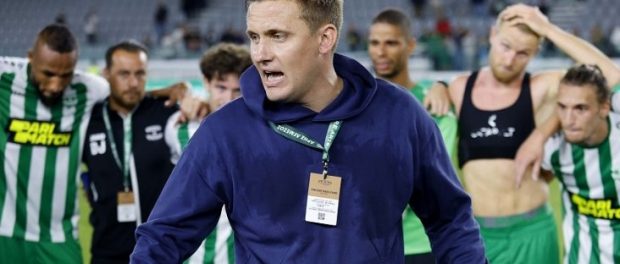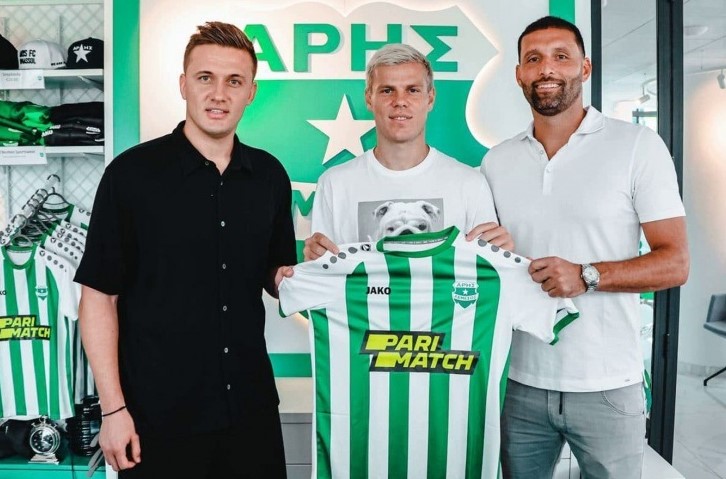Alexei Shpilevski won Cyprus football champiohsip with Aris Limassol

The championship of not the most formidable Aris from Limassol under Alexei Shpilevski, who has already achieved success with Kairat in Kazakhstan, is reason to be happy for the specialist from Belarus again.
Yes, the strength of the Cyprus championship should not be exaggerated. According to the current ranking of UEFA associations, the tournament occupies 21st place, behind, for example, Croatia, Serbia and Norway. It is clearly unlikely to be considered a top tier. But it is definitely higher than the championships of Kazakhstan and Belarus, where Alexey worked as a head coach before.
In Limassol, Shpilevsky found something he didn’t have in Brest and probably in the second Bundesliga – the credit of trust from the management:
“It came as a big surprise to me here in Cyprus that clubs don’t have enough patience to give a coach a chance. I’m happy that the owner of Aris thinks otherwise. We’ve had our ups and downs, but we’ve never lost our way.”
There have indeed been occasions for drastic decisions. A six-game winless streak at the end of last season cost the team a medal – the club finished only fourth. This winter, Aris went seven games without a win (including the Cup loss). By the way, the Cup, by the way, was a failure for the club. The team left it in the 1/8 finals, losing to one of the main rivals – APOEL. The debut at the European Arena did not bring any positive results. The club from Limassol lost only two games in the Conference League, losing in the second qualifying round to Baku Neftchi. But those defeats didn’t convince the bosses to part ways with the coach. And that decision was correct.
It made the Belarusians’ job easier and he took an active part in the transfer policy – new candidacies are being approved by Shpilevskiy. It is unlikely the performance would have been so successful if there was only demand and pressure from the management.
And the current club is much closer to Kairat than to Erzgebirge (the coach’s previous team) – there is a very large Russian-speaking diaspora in Limassol. Aris even has a Russian-language Telegram channel. The owner of the club is Belarusian Vladimir Fedorov. Among his charges there are Yevgeniy Yablonskiy, Artem Shumanskiy, Alexander Kokorin and Julius Szoke, who successfully played for Shakhtar Soligorsk and speaks Russian well. One of the assistants on the coaching staff is the Latvian national team legend Vitaly Astafiev. Many of the club’s employees are also natives of the former Soviet Union (for example, the academy’s sports director is Nikita Kovalchuk, creator of the YouTube channel Kartaviy Futbol).
The factors that facilitated the path to success or added a fly in the ointment are over at this point. Achievements that allow us to see the skills of the Belarusian specialist are more important.
“Aris is a modest club, even by Cypriot standards, spending only its second consecutive season in the elite. The total value of its players is 14.6 million euros. In comparison, Paphos, led by the legendary Spaniard Michel Salgado, has 22.73 million euros.
One of the factors in the championship is the brilliant play of Alexander Kokorin. After his criminal record and mocking period in Italy, he not only helped the team, but also had the best season of his career in scoring (13 goals). He was the soul of the team in the locker room and the leader on the field – the MVP award confirms it.
“Sasha for me is a central axis player. Can act in the midfield corridors. But he is not a flank player, although in previous teams they used him that way. Sasha needs to be comfortable on the field. He has the first touch, the sense of a partner, the assessment of the game situation at a crazy level. With him we run out to attack perfectly,” – a tactical analysis from Alexey Shpilevskiy.
A few years earlier, the Belarusian coach easily got along in Kazakhstan with no less bright and rebellious Brazilian Wagner Love. It seems the specialist has drawn the right conclusions from the SEALs story. About what he recently indirectly admitted in an interview: “I don’t go to 30-year-old players saying I want to develop them. What’s important is the result – it affects mood and training and everything else.”
To be fair, some of the experienced players left the club before the start of the season – gone are the Argentine Facundo Roncaglia, the Spaniard Manu Garcia and the Croatian Gordon Schildenfeld, who played in championships from the top five. But six Aris players over the age of thirty are also quite a few.
In Brest, the coach surprised many by using a rare 5-2-1-2 formation (Isloch played a similar style this season). But over time, Shpilevsky came to a different formation – Kairat and Aris played the majority of matches under the Belarusian spent on a more common 4-4-2 scheme with two supporting midfielders.
However, the main argument in favor of the success of Shpilevsky, who also received an individual award – the prize for the best coach of the championship of Cyprus – is the ability to work with a large number of legionnaires. Despite the considerable Russian-speaking environment, the main language of communication of the coach, who is fluent in foreign languages, is English. The team consists of representatives of 21 (!) nationalities. The coaching staff includes specialists from Cyprus, Greece, Latvia and Germany. A true international, which must not only build communication, but also take into account different mentalities. Would any other Belarusian coach be able to work in such a multifaceted foreign


Leave a comment